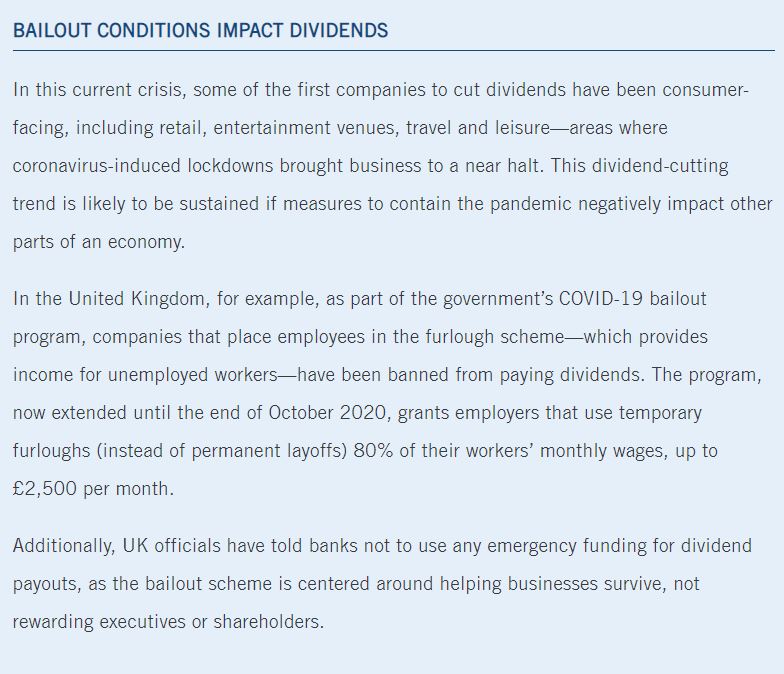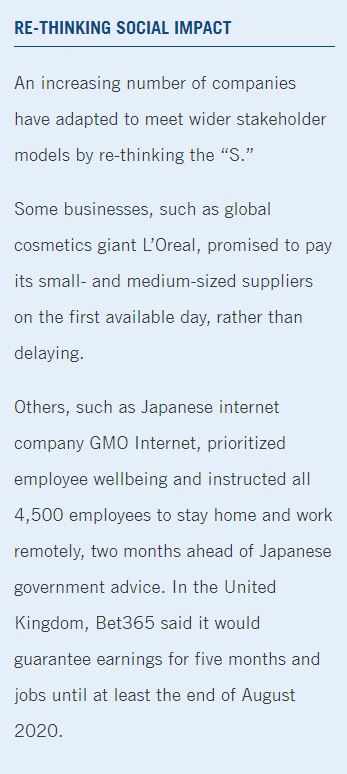13 Aug 2020
Julie Moret Head of ESG, Franklin Templeton Investments
Dislocations resulting from the pandemic shine a light on environmental, social and governance (ESG) issues, which can be used as an additional tool to identify leading companies from the laggards, according to Franklin Templeton’s Global Head of ESG, Julie Moret. She explains why she believes the pandemic has propelled “S” issues to the forefront, and how this environment could cultivate a fertile backdrop for active management.
While the crisis has no doubt emphasized how critical balance sheet resilience is now for companies and their longer-term viability, it has also accelerated a number of environmental, social and governance (ESG) themes which existed before the crisis. Many investors and executives argue that now is the time to “build back better” and create a more sustainable corporate world.
Against this backdrop, we see three near-term implications for investors which we believe will be sustained over the longer term.
The crisis has both intensified and highlighted a range of societal issues, such as growing inequality and the fragility of customers and employees, especially in certain segments of the economy which have been left with little protection. It has also underscored the interconnectedness of people, the planet and profit.
These drivers will increasingly require us to reframe what a well-managed business looks like. It reflects the increased pressure all companies face to manage a wider group of stakeholders beyond just shareholders. What we’re advocating are the ingredients that go into capturing quality and incorporate wider attributes. The crisis shines a light on the growing relevancy to corporates of wider stakeholder-oriented models, which provide equitable returns not just to shareholders but to employees, customers and suppliers, as well as the effective management of environmental externalities. All these considerations ultimately earn a company’s social license.
This infers a focus on stewardship and active engagement by investors. As investors, we are responsible stewards of our clients’ capital, which is to say we look after the assets our clients have entrusted us, with a view of returning them in a better condition than which we acquired them in the first place. ESG information provides an assessment on how companies are managing these issues. As such, it becomes a tool not only to further differentiate between well-run businesses versus the laggards, but also identify companies that are making a positive societal impact.
We’ve been advocating this for quite some time—companies need to consider wider stakeholder models in a changing world. We are mindful that businesses today are facing significant cost pressures in regard to allocating capital towards the welfare of staff, customers and suppliers.
The conversations we’ve had with companies during this uncertain period have revolved around the strength of balance sheets, cash flow sufficiency and liquidity—all of which we use to assess whether a business can continue to operate over the long term. Our messaging has focused on exercising prudence and caution with a view that management should review the appropriateness of dividend and buyback programs, examining whether these policies could weaken the operational viability of the business in the face of the near-term pressures we outline above.

The coronavirus pandemic has put human capital under the spotlight—issues such as employee contracts and rights have come to the forefront as investors and civil society scrutinize how businesses act during the crisis, including the way they treat their workers.
The crisis has exposed the fragility of independent contractors within the gig economy and those on zero-hour contracts in sectors heavily affected by the crisis, such as entertainment and leisure. Many of these workers have been left with little protection, both financial and health-wise. Post COVID-19, it is reasonable to expect sustained pressure on companies to improve labor rights and pay, which represents higher costs for companies and implies the levels of free cash flow distribution back to shareholders are unlikely to revert back to pre-COVID-19 levels, at least in the near term.
Corporate culture has also reached a turning point. We sense a shift in perception where virtual meetings and flexible working hours become more acceptable as business leaders consider how to create an environment conducive to employee needs. We’ve observed creative solutions some companies have made during the current crisis, including use of new technologies, including telecommunications.
Sustained growth in client demand for environmentally focused capabilities, along with political and regulatory momentum in a number of countries, will likely ensure environmental matters aren’t eclipsed by the near-team focus on the societal issues.
In fact, a study we sponsored earlier this year revealed that environmental issues remain top of mind for investors.1 When asked to rank ESG factors, nearly half of the respondents in the survey (46%) said they believe environmental factors are the most important, with just 34% citing governance, and the remaining 20% for social issues.
The growing relevancy of environmental issues linked to climate change, natural resource scarcity and efficiency is undoubtedly driving greater interest in ESG products and solutions. Regulatory pressures are also accelerating these themes. Encouragingly, the study’s findings show that advisers are responding to the increased demand for ESG-focused strategies from clients, which should help deepen the industry’s knowledge and innovation in this space.
The crisis has underscored our conviction that companies which take environmental and social issues into consideration, and have good standards of corporate governance, will likely be more resilient businesses and better at navigating periods of shocks. We remain convinced that the time invested in understanding and integrating ESG issues into the investment process, in addition to our corporate engagement, makes us better-informed investors.

Franklin Templeton partnered with NMG Consulting to undertake a comprehensive study. NMG examined the attitudes of financial advisers and intermediaries towards responsible investing in 10 major markets across the globe, in EMEA, APAC (Japan and Australia) and North America. The survey was conducted online with 824 adviser respondents, including 388 across Europe in Denmark, France, Germany, Italy, the Netherlands, Norway, Sweden, Switzerland and the UK. Fieldwork took place between April and June 2019.
Respondents were selected based on job titles and typically held the position of “financial adviser”, although some variation was introduced based on region. Respondents were required to have existing clients with responsible investment allocations, with screening and trap questions used to exclude ineligible participants.
ENDNOTES
Franklin Templeton and NMG Consulting, March 2020. The study examined the attitudes of 800 financial advisers and intermediaries towards responsible investing in 10 markets across the globe in EMEA, APAC and North America.
What Are the Risks?
All investments involve risks, including potential loss of principal. The value of investments can go down as well as up, and investors may not get back the full amount invested. Stock prices fluctuate, sometimes rapidly and dramatically, due to factors affecting individual companies, particular industries or sectors, or general market conditions. Investments in foreign securities involve special risks including currency fluctuations, economic instability and political developments. Investments in emerging markets, of which frontier markets are a subset, involve heightened risks related to the same factors, in addition to those associated with these markets’ smaller size, lesser liquidity and lack of established legal, political, business and social frameworks to support securities markets.